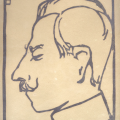A German Classic 2025: Rainer Maria Rilke's Neue Gedichte/New Poems (Part I : 1907, Part II: 1908)

© Stephen Cohn
We are delighted to announce the launch of this year’s ‘A German Classic’- our annual essay competition for sixth-form students. This year we would like to invite you to read with us a selection of poems by Rainer Maria Rilke (1875 – 1926), widely regarded as one of the most important German-language poets.
In addition to our essay competition, we introduce a Discovery Section designed especially for those with no prior knowledge of German, making the competition more accessible than ever.
We have put together a free study pack, including a set of multimedia materials, that will help you delve into Rilke’s compelling poems, even if it’s the first time you read a poem.
Selected poems:
Der Panther (The Panther)
Das Einhorn (The Unicorn)
Jugend-Bildnis meines Vaters (Portrait of My Father as a Young Man)
Römische Fontäne (Roman Fountain)
Das Karussell (The Merry-Go-Round)
Spanische Tänzerin (Spanish Dancer)
Archaïscher Torso Apollos (Archaic Torso of Apollo)
Papageien-Park (The Parrot House)
Die Flamingos (The Flamingos)
Der Ball (The Ball)
For all details about eligibility, study packs, essay questions, submission, judging criteria, and more, see here.
Essay topics:
First Prize: £500
Second Prize: £300
Third Prize: £100
- Rilke dedicated the second part of his Neue Gedichte to the sculptor Auguste Rodin. Is it helpful to view the Neue Gedichte as equivalent to sculptures? Discuss with reference to examples from the selection.
- The Neue Gedichte are often referred to as ‘Dinggedichte’. To what extent are they poems about things?
- How does Rilke suggest movement in the Neue Gedichte?
- How does Rilke use language, imagery and other poetic techniques to enable the reader to imagine the subjects of his Neue Gedichte? Discuss with reference to three poems from the selection.
- Create translations in poetic form of two poems from the selection of Rilke’s Neue Gedichte and write a commentary explaining your translation choices.
- Find TWO existing translations of ONE of the poems from the selection and compare them critically.
Notes:
You must refer to poems in the selection above but need not restrict your discussion to them.
Your essay must include a bibliography that lists all published sources you have used in writing your essay or translation and commentary, including any existing translations (please provide URL’s for internet sources).
DISCOVER A GERMAN CLASSIC – ESSAY PRIZE FOR BEGINNERS IN GERMAN 2025–26
(This competition is restricted to participants who do not have a GCSE in German or equivalent qualification, or an equivalent knowledge of the German language.)
Rainer Maria Rilke, New Poems
(Part I : 1907, Part II: 1908)
Selected poems as above
First Prize: £200
Second Prize: £100
Third Prize: £50
1) How does Rilke use metaphors to enable the reader to imagine the subject given in the poem’s title? Discuss with reference to TWO or THREE poems from the selection.
2) Choose TWO or THREE poems about real or imaginary animals from the selection. Examine the poetic techniques Rilke uses to depict them and consider what aspects of the animals they draw to the reader’s attention.
3) To what extent do the individual poems depict a development – and what is it that changes in the course of the poem? Discuss with reference to TWO or THREE poems from the selection.
Notes:
You must refer to poems in the selection above but need not restrict your discussion to them.
You may, but need not, include reference to the German text. Correctness of any references to German will not be taken into account in judging the quality of your essay.
Your essay must include a bibliography that lists all published sources including all translations you have used in writing your essay (with URL’s for internet sources).
QUERIES
If you have any questions, please email the Prize Coordinator, Santhia Velasco Kittlaus, at germanclassic@mod-langs.ox.ac.uk.

